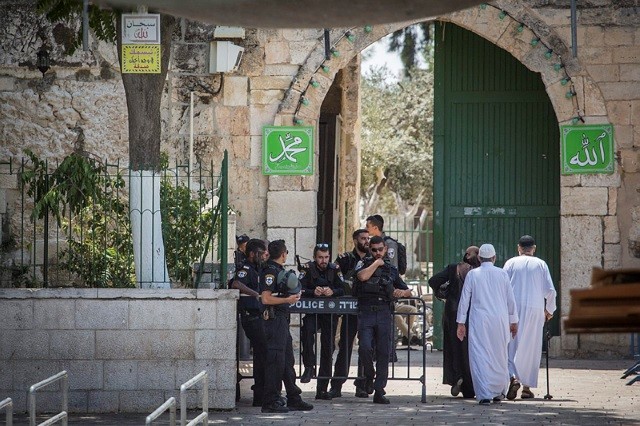Muslim leaders ended their Temple Mount boycott on Thursday after Israel removed the last security measures recently introduced to thwart terror attacks at the holy site.
Israel’s police late Wednesday night removed a set of security cameras and gates it installed at the entrance to the Temple Mount. Following these steps, Palestinian and Muslim leadership ended their boycott of the Temple Mount and allowed their followers to return to the compound.
“After extensive discussion and after achieving this victory in this round we call on our people in Jerusalem and inside (Israel) and anyone who can access the Al-Aqsa Mosque to enter … en masse,” the Islamic leaders declared in a statement.
The head of the Supreme Islamic Committee, Ikrema Sabri, said the first prayers would be held there Thursday afternoon.
Muslim worshipers viewed this development as a victory and reacted with public displays of joy, chanting “Allahu akbar” (God is Great) and setting off fireworks.
Muslim worshipers on Tuesday and Wednesday boycotted the Temple Mount by holding prayers outside the holy site, despite Israel’s removal of the metal detectors that sparked the latest round of violent protests.
The boycott came after Israel seemingly capitulated to the week-long Palestinian violence and removed the security measures installed at the site after Arab terrorists shot and killed two Israeli police officers there.
Israel says the measures were necessary to prevent further attacks, while Palestinians claim Israel is trying to expand its control over the Temple Mount.
Capitulation Spells More Violence
While Israel has removed all security measures in an attempt to deescalate tensions, it plans to install a network of smart cameras.
A poll shows that almost four out of five Israelis disagree and are disappointed with the Security Cabinet’s decision to remove metal detectors, viewing it as a form of capitulation on Israel’s part.
Minister of Education Naftali Bennett, a member of the Security Cabinet who voted against the removal of the security measures, warned that Israel’s capitulation could spell more violence in the long term.
Speaking to IDF Radio on Thursday, Bennett said, “Every time the state of Israel folds in a strategic way we get hit with an intifada [violent Palestinian uprising]. You seemingly benefit in the short term but in the long term you harm deterrence.”
By: Aryeh Savir, World Israel News
AP contributed to this report.


